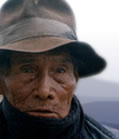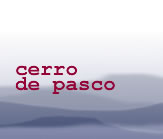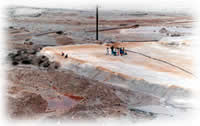 |
 |
||
 |
|||
|
RELATED THEMES agriculture development environment justice and crime livestock spiritual beliefs OTHER LOCAL THEMES BACKGROUND |
land
Mostly, though, the reforms were welcomed and some of the continuing struggle for communities to improve their lot seems less to do with flaws in the reform process and more to do with an unmet need for assistance to develop agriculture and rural industry: "Technology must be introduced to the countryside, we must try to introduce the appropriate techniques so we can produce more" (Peru 15). The land needed for farming and herding was also rich in minerals, and communities and individuals continued to face battles over land access and ownership, as the big mining companies - both under the state and under the gringos - expanded their operations. One woman says: "Sir, a lot of communities have lost their land and nothing has been done about it, the people have gone away - they haven't defended themselves at all. We don't want this for our families, we live here.I don't know if you have seen it... they've been extracting minerals from round here, Centromin, for example.That's what it's like with the mines, they've swallowed up the people and their land." Sometimes the companies didn't take over the land, but their activities still deprived communities of it. Whole swathes of pasture, for example, have been rendered useless by industrial waste. Yet despite the environmental pollution and the gradual undermining of the farming way of life, a sense of spiritual attachment to the land remains strong: "For us, it's important to be in harmony with the animals and the land. Every [February], we put ribbons on the animals' ears so that they're happy and Grandfather mountain, the land, also gets a table [laid with] coca and cane alcohol. We can't forget these customs because they're part of our lives, our beliefs, our faith. And if something happens like animals go missing, Grandfather Mountain must be complaining about something" (Peru 29). quotes about land"The Andachacha hacienda was over the way, in Lircari. That's where my father-in-law worked as a bricklayer, and I, honourably, in poverty, used to work spinning, weaving, washing clothes, with my mother. I grew up having to work because I didn't have a father. The haciendas used to be big - the bosses were the hacienda owners and we worked for them. But all this came to an end with the agrarian reform." "We're anxious to reclaim our territory. We've arrived at a point where we don't have enough space for the livestock. You asked about the changes that have occurred in the community, well - this is an historical change. Meaning that for ever, since the arrival of the Spanish, since the arrival of the Gringos and their huge mining companies, my community, our communities, have continually lost their land, whether it be through pillage or expropriation." ".since mining became large-scale in this area many of my family have been in both mining and farming. but they have always remained part of the campesino world... maybe it's because it's close enough to go to the mine from the community and earn a bit more money to supplement income from farming. Another important reason is feeling part of what we call the Andean world - where our customs are still strong and our attachment to the land is the essence of our lives. No matter where we may be we always feel drawn to where we were born." "Most town folk work individually - they either work in mining or they work with natural resources like sand for building, etc. Little by little most people are losing their link with the land. But the campesino community, San Antonio de Rancas, celebrates the [animals] feast and they also have a Production Cooperative where community members are shareholders and they rear cattle, so they still have a strong link with the land." "I'm from La Oroya and this hurts me. Before we had our own land, but one day they kicked us out, they told us that the land was sold, that it had been bought. That's the story our grandparents told us, that's the story of the plundering of the lands of the campesino community of La Oroya. [They took the land] that is now occupied by La Oroya's smelter." |
|
 For a population of primarily farmers and herders, access to land was obviously of fundamental importance. Many narrators remembered the time of wealthy landowners with their vast haciendas, and spoke of how they had benefited from land reform in the late 60s and early 70s. There is some criticism, however, of the reforms and how communities had to "buy back" land that had been taken from them in the past. One man (Peru 29) tells a powerful story of how he and others challenged the ruling for their community:
For a population of primarily farmers and herders, access to land was obviously of fundamental importance. Many narrators remembered the time of wealthy landowners with their vast haciendas, and spoke of how they had benefited from land reform in the late 60s and early 70s. There is some criticism, however, of the reforms and how communities had to "buy back" land that had been taken from them in the past. One man (Peru 29) tells a powerful story of how he and others challenged the ruling for their community: